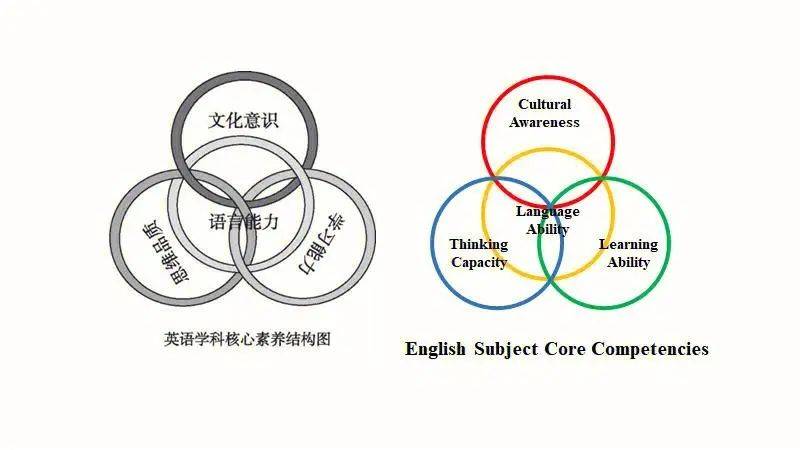英语“核心素养”的英文表达
英语教师通用评课稿及常用语(含小初评课案例16篇)
新课标中24个话题的英语词汇思维导图
背诵+默写:学英语的黄金搭档
新学期抓早读!高效英语早读优化方案来了!(附评价标准)
爱心提示
由于微信公号改版不再按时间流推送,互动少的读者会逐渐接收不到(及时)推送。
为防失联,及时看到新内容,推荐大家或可多点在看和留言,或是设个星标。
感恩大家一直以来的支持,期待更多好内容能与大家准时相遇。

一
Subject Core Competencies and Goals
1 Subject Core Competencies
The core competencies achieved through the learning of a school subject are the concentrated reflection of the educational value of the subject, which consist of correct values and attitudes, indispensable qualities, and key abilities. The core competencies achieved through the English subject include language ability, cultural awareness, thinking capacity, and learning ability.
1.1 Language ability
Language ability is the ability to understand and express meaning in social contexts by way of listening, speaking, reading, viewing, and writing. Language ability also includes language awareness and a feel for language developed in the course of learning and using English. The English language ability constitutes a foundation for developing the English subject core competencies. The development of language ability entails the improvement in cultural awareness, thinking capacity, and learning ability, which will help students broaden their international horizons, enrich their ways of thinking, and participate in cross-cultural communication.
1.2 Cultural awareness
Cultural awareness consists of an understanding of Chinese and foreign cultures, recognition of excellent cultures, and cross-cultural cognition, attitudes, and behaviors which students demonstrate in the context of globalization. Cultural awareness reflects the value orientation of the English subject core competencies. The development of cultural awareness helps students enhance their national identity and patriotism, increase their cultural confidence, cultivate a sense of community with a shared future for mankind, learn to enhance self-cultivation and function properly in society, and thus become educated and responsible persons.
1.3 Thinking capacity
Thinking capacity refers to students’ skills employed in thinking and the quality of their thinking in terms of logicality, criticality, and innovativeness. Thinking capacity represents the cognitive aspect of the English subject core competencies. Cultivating thinking capacity helps students enhance their ability to analyze and solve problems, observe and understand the world from a cross-cultural perspective, and make correct value judgments on things.
1.4 Learning ability
Learning ability refers to students’ awareness and ability to use and adjust English learning strategies actively, and expand English learning channels so as to increase the efficacy of English learning. Learning ability paves the way for students to develop the English subject core competencies. Developing learning ability helps students manage their English learning autonomously, develop good learning habits, acquire learning resources through multiple channels, and increase learning efficacy.

2 Goals
The general aim of the general senior high school English curriculum is to implement theParty’s education policy comprehensively, cultivate and practice core socialist values, implement the fundamental task of fostering virtue through education, and further promote students’ English subject core competencies on the basis of compulsory education so as to make students become socialist builders and successors with love for China, international vision, and cross-cultural communication abilities.
Based on the general aim of the English curriculum, the specific goals of the English curriculum are to cultivate and develop students’ subject core competencies which include language ability, cultural awareness, thinking capacity, and learning ability. The development of each component of the English subject core competencies is divided into three levels, which are specified in “Appendix I: Levels of the English Subject Core Competencies.” Through the learning of the curriculum, students should be able to achieve the development goals of the core competencies set by the General Senior High School English Curriculum Standards.
2.1 Language ability goals
Students should have a certain degree of language awareness and a feel for the English language, and should be able to integrate the existing language knowledge for use in specific regular contexts, understand the meaning expressed in spoken and written texts, identify the ways of expressing appropriate meanings, and use spoken and written language to express meaning and conduct interpersonal communication effectively.
2.2 Cultural awareness goals
Students should be able to acquire cultural knowledge, understand cultural connotations, compare cultural similarities and differences, take in cultural essence, form correct values, enhance cultural confidence, form good characters of self-esteem, confidence, and self-improvement, and develop skills for cross-cultural communication and the transmission of Chinese culture.
2.3 Thinking capacity goals
Students should be able to understand and analyze specific phenomena related to language and culture, organize and summarize information, construct new concepts, analyze and infer the logic in information, judge all kinds of ideas, and express their own views creatively. Students should develop the ability to think in an open and creative way.
2.4 Learning ability goals
Students are required to establish correct attitudes toward English learning, keep sustained interest in English learning, have clear learning objectives, be able to acquire English learning resources through multiple channels, plan the learning schedule and learning tasks effectively, choose appropriate strategies and methods, monitor, evaluate, reflect on, and adjust learning content and progress, and gradually improve the awareness and ability to use English to learn other school subjects.

二
附:中文版
学科核心素养与课程目标
(一)学科核心素养
学科核心素养是学科育人价值的集中体现,是学生通过学科学习而逐步形成的正确价值观、必备品格和关键能力。英语学科核心素养主要包括语言能力、文化意识、思维品质和学习能力。
1. 语言能力
语言能力指在社会情境中,以听、说、读、看、写等方式理解和表达意义的能力,以及在学习和使用语言的过程中形成的语言意识和语感。英语语言能力构成英语学科核心素养的基础要素。英语语言能力的提高蕴含文化意识、思维品质和学习能力的提升,有助于学生拓展国际视野和思维方式,开展跨文化交流。
2. 文化意识
文化意识指对中外文化的理解和对优秀文化的认同,是学生在全球化背景下表现出的跨文化认知、态度和行为取向。文化意识体现英语学科核心素养的价值取向。文化意识的培育有助于学生增强国家认同和家国情怀,坚定文化自信,树立人类命运共同体意识,学会做人做事,成长为有文明素养和社会责任感的人。
3. 思维品质
思维品质指思维在逻辑性、批判性、创新性等方面所表现的能力和水平。思维品质体现英语学科核心素养的心智特征。思维品质的发展有助于提升学生分析和解决问题的能力,使他们能够从跨文化视角观察和认识世界,对事物作出正确的价值判断。
4. 学习能力
学习能力指学生积极运用和主动调适英语学习策略、拓宽英语学习渠道、努力提升英语学习效率的意识和能力。学习能力构成英语学科核心素养的发展条件。学习能力的培养有助于学生做好英语学习的自我管理,养成良好的学习习惯,多渠道获取学习资源,自主、高效地开展学习。

(二)课程目标
普通高中英语课程的总目标是全面贯彻党的教育方针,培育和践行社会主义核心价值观,落实立德树人根本任务,在义务教育的基础上,进一步促进学生英语学科核心素养的发展,培养具有中国情怀、国际视野和跨文化沟通能力的社会主义建设者和接班人。
基于课程的总目标,普通高中英语课程的具体目标是培养和发展学生在接受高中英语教育后应具备的语言能力、文化意识、思维品质、学习能力等学科核心素养。普通高中英语学科核心素养各要素的发展以三个水平划分,水平描述参见“附录1英语学科核心素养水平划分”。通过本课程的学习,学生应能达到本学段英语课程标准所设定的四项学科核心素养的发展目标。
语言能力目标:具有一定的语言意识和英语语感,在常见的具体语境中整合性地运用已有语言知识,理解口头和书面语篇所表达的意义,识别其恰当表意所采用的手段,有效地使用口语和书面语表达意义和进行人际交流。
文化意识目标:获得文化知识,理解文化内涵,比较文化异同,汲取文化精华,形成正确的价值观,坚定文化自信,形成自尊、自信、自强的良好品格,具备一定的跨文化沟通和传播中华文化的能力。
思维品质目标:能辨析语言和文化中的具体现象,梳理、概括信息,建构新概念,分析、推断信息的逻辑关系,正确评判各种思想观点,创造性地表达自己的观点,具备多元思维的意识和创新思维的能力。
学习能力目标:树立正确的英语学习观,保持对英语学习的兴趣,具有明确的学习目标,能够多渠道获取英语学习资源,有效规划学习时间和学习任务,选择恰当的策略与方法,监控、评价、反思和调整自己的学习内容和进程,逐步提高使用英语学习其他学科知识的意识和能力。
来源 | 称子英语
明师俱乐部进行综合整理,如涉及版权问题,请及时与我们联系。
教学资源、精彩活动、趣味互动
福利折扣、在线咨询
请不要重复添加明老师
The English 素养 in版权声明
本文来自投稿,不代表本站立场,转载请注明出处。
